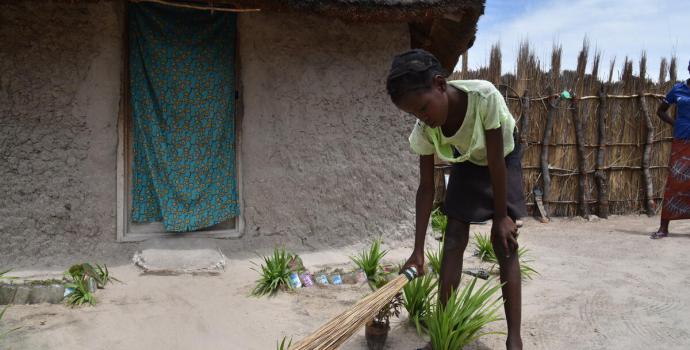Source: Save The Children
Slow onset disaster: How climate change in Zambia is creating hidden misery for millions
LUSAKA, 7 April – Farming families in Zambia are experiencing a slow and silent climate crisis that has driven about 13% of the population into severe food shortages and which is having a knock-on effect across the country, said Save the Children.
About 1.58 million people – including an estimated 821,000 children – are now facing an underreported environmental disaster, including late rains, prolonged dry spells, extreme high temperatures, devastating insect swarms, and floods.
Zambia topped a list of the world’s underreported crisis in 2021 as other emergencies overshadowed the slow creeping yet catastrophic suffering and enormous needs in this large, peaceful country in Southern Africa. Rising hunger levels are impacting the ability of children to go to school, with some staying home due to hunger pains, and contributing to some of the highest malnutrition rates in the world.
Farming families producing maize, the country’s principal food crop, are being significantly affected by changes in weather patterns with the rainy season coming later each year, and the share of time spent in dry season or drought becoming progressively longer.
Smallholders account for 90% of food produced in Zambia and the impact on their lives by changing weather patterns has a knock-on effect across the country. With declines in crop yield and production impacting household incomes, in turn impacting the capacity of people across the country to purchase goods and services, the overall economy is being damaged by the crisis. After 15 years of economic progress, including achieving lower middle-income status in 2011, Zambia’s economy has stalled, and the country now has among the highest wealth inequality in the world.
The Zambezi river floodplains in Western Province are some of the worst impacted areas, with 10 of 16 districts estimated to be in crisis levels of food insecurity. While the region continues to receive annual floods – a vital part of the cultivation cycle – the rains are coming later, and falling for a shorter period. This leaves farmers with little time to sow their crops and grow them to maturity before the long, dry season starts.
Clement, 42, is a father of five in the Western Province of Zambia. He is a subsistence farmer and has seen his family become poorer over the years because of the increasingly erratic rainfall in the region. He said:
“The rains were delayed – they started in January – so the time for the rains will be too short, we had to plant too late, and the plants won’t have time to get mature. The issue is that when it rains, it is too late for us to farm properly.
“I have seen a change, with the rain patterns. It used to rain earlier, in September or October. But this time and in recent years, it is not. The rains have changed from October to January this year.
“We know there is a change in climate, and we know we need to change crops. The change is here. In the past, we used to experience heavy floods. But now, when the floods come, they come suddenly, and leave abruptly, damaging the crops.”
Namakando, 42, is a father of four who lives in the Western Province of Zambia. He is a subsistence farmer and relies on seasonal rains, floods and dry seasons to cultivate his crops. He said:
“In the past, the rains used to come earlier. Now, they come late. And they don’t stay for long; all of a sudden it will stop raining. And we experience the dry seasons for a longer period and the rains for a shorter period.
“We have a challenge with food, which is bad for the children. When they don’t eat well, they don’t go to school, because they won’t go when they are too hungry.
“In the past, the harvest would have been ready by now, we wouldn’t have needed to buy it. I don’t know why things are changing. I haven’t heard of the term climate change.”
Jo Musonda, Save the Children Country Director in Zambia, said:
“Zambia is a country that rarely hits the headlines. Its people are peaceful and don’t draw attention to themselves. However, this positive characteristic of the country is working against it, with a slow yet catastrophic crisis bubbling just beneath the surface.
“We work with farmers across the country who don’t know what climate change is, but know something is changing. They tell us they can’t plan their harvest anymore, that they need to change crops but they have no experience in doing so, or access to different seeds. They are resilient and resourceful, but they hadn’t thought they would need to adapt to an entirely new climate.
“The farming families of Zambia deserve better. Children of farmers deserve to know that there will be a future for them on the land of their forbears, that the actions by greedy individuals and companies in countries far away won’t rob them of the little they have.”
Save the Children has been working in Zambia for nearly 40 years, running health, nutrition, education and protection programs across the country. In response to the climate crisis, Save the Children is supporting children and their families impacted by drought and floods, providing education support to children, emergency cash and voucher assistance and school feeding programmes.
—
Multimedia content available here:
https://www.contenthubsavethechildren.org/Package/2O4C2SSLC4UT
- Maria*,11:
https://www.contenthubsavethechildren.org/Package/2O4C2SSLCR9N



